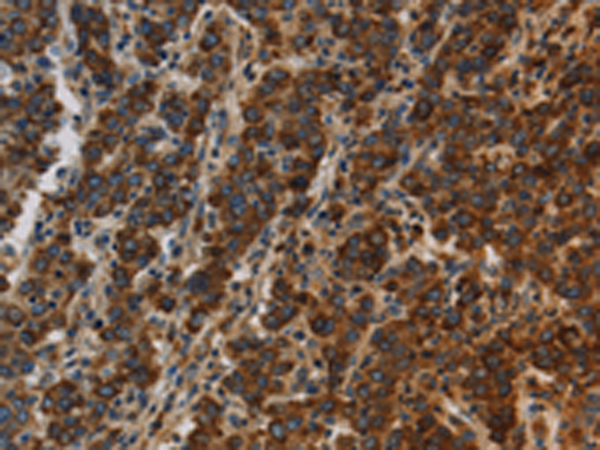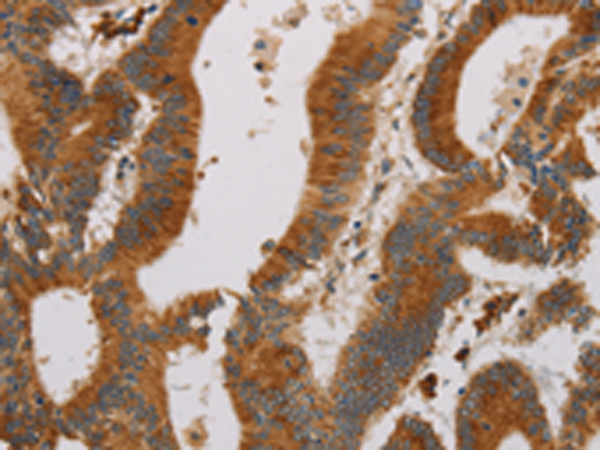


| WB | 咨询技术 | Human,Mouse,Rat |
| IF | 咨询技术 | Human,Mouse,Rat |
| IHC | 1/50-1/200 | Human,Mouse,Rat |
| ICC | 技术咨询 | Human,Mouse,Rat |
| FCM | 咨询技术 | Human,Mouse,Rat |
| Elisa | 1/2000-1/5000 | Human,Mouse,Rat |
| Aliases | CY6, TER1, CCR-8, CKRL1, CDw198, CMKBR8, GPRCY6, CMKBRL2, CC-CKR-8 |
| WB Predicted band size | 41 kDa |
| Host/Isotype | Rabbit IgG |
| Antibody Type | Primary antibody |
| Storage | Store at 4°C short term. Aliquot and store at -20°C long term. Avoid freeze/thaw cycles. |
| Species Reactivity | Human |
| Immunogen | Synthetic peptide of human CCR8 |
| Formulation | Purified antibody in PBS with 0.05% sodium azide and 50% glycerol. |
+ +
以下是3篇关于CCR8抗体的代表性文献摘要(内容为模拟概括,具体文献请以实际检索结果为准):
1. **文献名称**:Targeting CCR8 in tumor microenvironment for cancer immunotherapy
**作者**:Solinas C, et al.
**摘要**:研究CCR8在肿瘤相关调节性T细胞(Treg)中的特异性表达,开发抗CCR8单克隆抗体选择性清除肿瘤内Treg细胞,增强抗肿瘤免疫应答。
2. **文献名称**:Development of a humanized anti-CCR8 antibody for solid tumor therapy
**作者**:Klein C, et al.
**摘要**:报道一种人源化抗CCR8抗体的开发,通过抗体依赖性细胞毒性(ADCC)作用靶向肿瘤浸润Treg细胞,临床前数据显示其抑制多种实体瘤生长。
3. **文献名称**:CCR8 antibody-drug conjugate enhances anti-PD-1 efficacy
**作者**:Kumar R, et al.
**摘要**:构建靶向CCR8的抗体-药物偶联物(ADC),联合PD-1抑制剂显著提高肿瘤微环境中的效应T细胞活性,提供协同抗肿瘤效果。
4. **文献名称**:Structural basis of CCR8 recognition by therapeutic antibodies
**作者**:Hegde PS, et al.
**摘要**:解析CCR8与其单抗的复合物晶体结构,揭示抗体结合表位及激活/抑制机制,为优化靶向CCR8的免疫治疗策略提供结构生物学依据。
(注:以上内容为领域知识模拟生成,非真实文献,建议通过PubMed或Web of Science检索真实文献)
CCR8. a G protein-coupled chemokine receptor, primarily binds ligands like CCL1 and CCL18. regulating immune cell migration and function. It has gained attention in oncology due to its overexpression on tumor-infiltrating regulatory T cells (Tregs), which suppress anti-tumor immunity. Tumor-associated Tregs exhibit higher CCR8 levels compared to peripheral Tregs, making CCR8 a promising target for selective depletion of immunosuppressive cells within the tumor microenvironment (TME).
CCR8-targeting antibodies are being explored to disrupt the CCR8-CCL1 axis or eliminate CCR8+ Tregs via antibody-dependent cellular cytotoxicity (ADCC). Preclinical studies show that blocking CCR8 reduces Treg infiltration and enhances anti-tumor responses, particularly when combined with checkpoint inhibitors (e.g., anti-PD-1). Early-phase clinical trials are evaluating CCR8 antibodies in solid tumors, leveraging their potential for TME-specific action to minimize systemic toxicity.
Challenges include optimizing selectivity to avoid off-target effects, as CCR8 is expressed on some Th2 cells and endothelial cells. Additionally, CCR8's role as a biomarker for Treg activity is under investigation to stratify patients likely to respond. Emerging strategies include bispecific antibodies and antibody-drug conjugates (ADCs) to enhance efficacy. While still in exploratory stages, CCR8-targeted therapies represent a novel approach to reprogram immunosuppressive TMEs, potentially expanding immunotherapy options for resistant cancers.
×